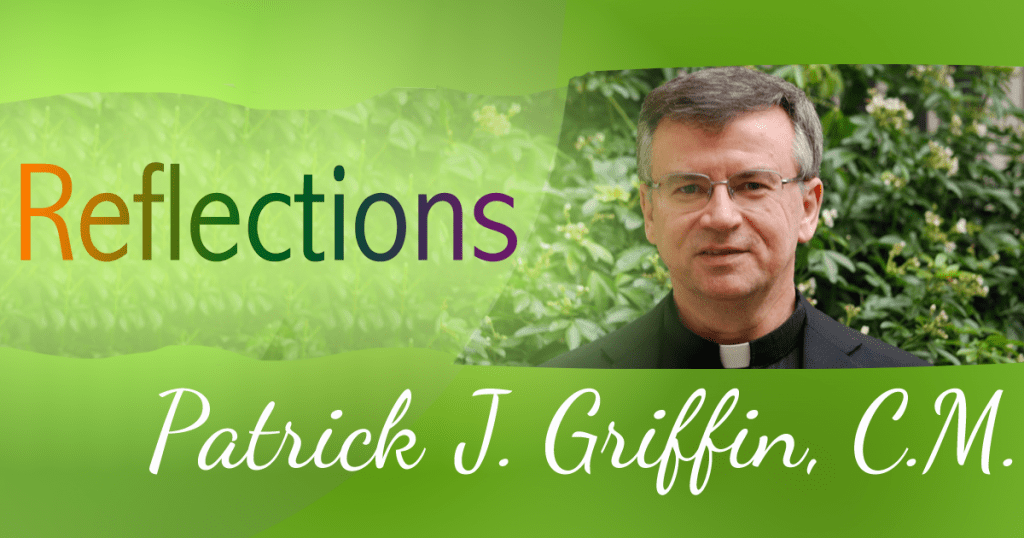On occasion, some college campuses run a program called “The Last Lecture.” We have done it a few times at St. John’s. The University invites Professors to consider this situation: if they could only give one lecture, their final lecture, what would it be and what would it be about. I have pondered that question for myself.

The Solemnity of Corpus Christi brings that dynamic to mind for me. On the night before Jesus was going to die, he gathered his disciples around him and asked himself in what way he wanted them to remember him and how he wanted to continue his presence among them.
He could have pointed to something precious like diamonds or gold and said “this will be my body and blood for you; this is how I will be present among you. Whenever you look at these valuable, solid, beautiful objects, remember me.” But, he did not do that. He could have pointed at the sun and said: “That will be my body among you. Whenever you feel the warmth of the sun, whenever you are guided by its light, then you will know that I am present among you in that enormous and powerful heavenly body.” But, he did not do that.
Instead, he took the simplest of elements, of food, and made those the reality of his presence. He took bread–little more than flour and water, the food of the poor–and said “this is my body.” He took the wine–the juice of the crushed and aged grape, the most modest of drinks–and said “this is my blood.” Jesus made himself present among us in the most basic of forms, as food that would be common to the simplest people in his day–everyday nourishment. He did not want to be present in some indestructible and enormous form, he wanted to be present in the everyday. Not in something to be looked at from the outside, but something which was to be taken within. Not in something to which the wealthy had privileged access, but in something which everyone knew. Something that gave not only spiritual, but also physical strength. Something that became a part of the one who partook of it.
On the Solemnity of the Most Holy Body and Blood of Christ—Corpus Christi—the bread and wine that will be present on the altar today will become corpus Christi, the body of Christ. However, it is not meant to remain on the altar, it is meant to be broken and shared and eaten by each one present at the Eucharistic celebration. It is food. And then, having received the Eucharist, we become corpus Christi, the body of Christ, both as individuals and as a community. As Paul said, “it is no longer I who live, but Christ who lives in me.” Christ lives in us.
We become Christ in the way in which this food becomes part of our own body, becomes the nourishment and strength to live our lives as Christian women and men. We might remember the famous teaching of St. Theresa of Avila:
Christ has no body but yours,
No hands, no feet on earth but yours,
Yours are the eyes with which He looks
Compassion on this world,
Yours are the feet with which He walks to do good,
Yours are the hands, with which He blesses all the world.
Yours are the hands, yours are the feet,
Yours are the eyes, you are His body.
Christ has no body now but yours,
No hands, no feet on earth but yours,
Yours are the eyes with which he looks
compassion on this world.
Christ has no body now on earth but yours.
In choosing to extend our hands to receive the Eucharist, we choose to take Christ within us. It is a serious responsibility but also a blessing and the gift of how he wanted to stay us. We pray today for a special reverence for this body and blood of Christ as it becomes present in this sacrament, as it becomes our nourishment and our witness to Christ’s continuing and lived presence among us. Christ has no body now on earth but ours.
As Vincentians, we can hear the particular call to be the body of Christ in the service of our brothers and sisters. We can also recognize the way in which the Lord dwells among us in them.





I, for one, appreciate very much your pointing out:
“However, it is not meant to remain on the altar, it is meant to be broken and shared and eaten by each one present at the Eucharistic celebration. It is food. And then, having received the Eucharist, we become corpus Christi, the body of Christ, both as individuals and as a community. As Paul said, ‘it is no longer I who live, but Christ who lives in me. Christ lives in us.”
Such an appreciation on my part, though, may just be born –I admit– of my being turned off by the notion, shared not by a few Catholics, that a strange dead language and silken vestments, “magna cappa,” too, and golden vessels and ornaments, create the ineffable and solemn mystery in the celebration of the liturgy. I think Pope Francis has addressed this question. And not too long ago, he asked priests not to wear “grandma’s lace” at Mass;
Anway, thank you , Fr. Griffin, for this Vincentian view of the Eucharist.
Fr. Pat,
Thanks – fruitful material to use in a forthcoming talk to our St Mary Parish Men’s Ministry group on the subject of the last sacrament – formerly “last rites” now “Anointing” – with the last Eucharist (usually) called viaticum, as I recall, as companion for the last journey HOME.
Joe & Mary